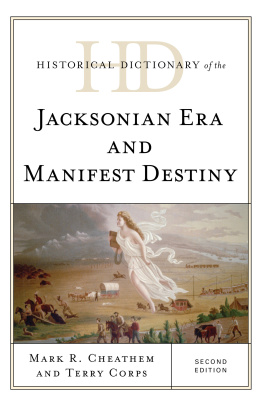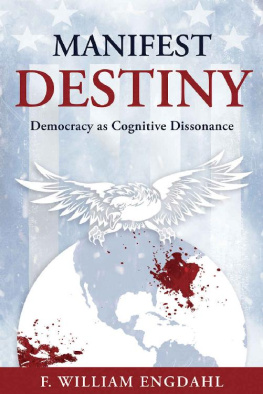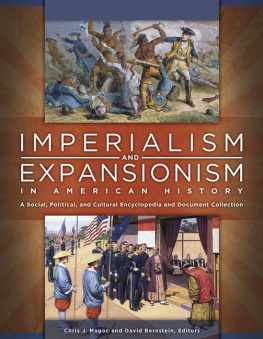Barakaldo Books 2020, all rights reserved. No part of this publication may be reproduced, stored in a retrieval system or transmitted by any means, electrical, mechanical or otherwise without the written permission of the copyright holder.
Publishers Note
Although in most cases we have retained the Authors original spelling and grammar to authentically reproduce the work of the Author and the original intent of such material, some additional notes and clarifications have been added for the modern readers benefit.
We have also made every effort to include all maps and illustrations of the original edition the limitations of formatting do not allow of including larger maps, we will upload as many of these maps as possible.
MANIFEST DESTINY
A STUDY OF NATIONALIST EXPANSIONISM IN AMERICAN HISTORY
BY
ALBERT K. WEINBERG
PREFACE
The writer takes pleasure in acknowledging the assistance which he has received in the preparation of this work. He is greatly indebted to Professor Arthur O. Lovejoy, of The Johns Hopkins University, not merely for criticism of his manuscript but also for past instruction which largely stimulated this application of methods of ideological analysis to political attitudes. He is also deeply in debt to Professor Kent Roberts Greenfield and Associate Professor William Stull Holt, of the Department of History, The Johns Hopkins University, for abundant encouragement, advice, and criticism. Mr. James Bunyan has given generously of his time and knowledge in editing the manuscript. The writers wife has been an indispensable helper in all stages of the work.
Valuable assistance was received from members of the Page School of International Relations, including Professor Frederick Sherwood Dunn, Professor Gilbert Chinard, and Dr. Ernest B. Price. It is only fair to state, however, that this assistance was directed toward the more effective development of the writers own ideas rather than toward the presentation of views common to the members of an institution. A study having to do with highly controversial issues of political history and morals demands treatment from an individual point of view; thus the errors or prejudices which may be in the following pages are the authors own. This book owes its existence fundamentally to the fact that the Page School not merely permits such individualism in research but apparently encourages investigators who wander somewhat from the most beaten tracks of study in order to attemptwhat is as intriguing as it is precariousexploration of the complex motives of international behavior.
ALBERT K. WEINBERG
FOREWORD
The most tantalizing problems faced by students of international relations are those which revolve around the question of motivation in national action. The rle of ideas and attitudes in determining the behavior of nations is an obtrusive factor in every international situation, yet in the present state of our knowledge this factor is shrouded in obscurity. The importance of the subject has long been recognized, but effective methods of analysis and tools of inquiry for dealing with it have not been adequately developed. The result has been that we have tended either to slight the subject or else to approach it primarily from a moral viewpoint, without, however, subjecting to careful critical analysis the logical basis of our moral judgments.
Consider, for example, the pervasive phenomenon called nationalism. We seek to explain the course of international events in terms of this complex pattern of ideas, feelings, dogmas, emotional drives, moral attitudes and what not, yet our explanations are often mere verbal cloaks to cover up our lack of comprehension of the elements involved. Thus to attribute the action of a nation or people in a specific situation to the spirit of nationalism may temporarily satisfy our desire for a causal explanation, but in reality it does little more than give a name to a complex set of variables that remain as far removed from our understanding as before. Much the same thing may be said in regard to our explanations of events in terms of imperialism, militarism, isolationism and other characteristic ideologies that appear as determinants of national action.
To this important problem of the ideological factor in international behavior, Dr. Weinberg now makes a striking contribution. The ideology of expansionism, which he has selected as the subject of his inquiry, is one that throws into peculiarly strong relief the operation of moral ideas in relation to national action. He has subjected to a new and fertile type of analysis the various manifestations of this ideology that have appeared in the course of the growth of the United States from an infant republic occupying the seaboard of a little-known continent to a vast world power with oversea possessions. The history of the moral justifications that have accompanied this development is an illuminating study of the evolution of American nationalism. At the same time it gives us insight into the general problem of the growth of ideologies and their relation to national action, and adds to our understanding of the behavior of men as members of a political body. It likewise reveals the extensive confusion of ideas and of moral values that often lies at the basis of national conduct.
As the period of American expansion recedes in time and takes on perspective, it stands revealed as an amazing phase of our national development. The mere physical extent of the territory acquired is impressive enough, but the really astonishing thing is the range of ideas and moral doctrines that have been advanced in justification of this extension of the national domain at the expense of otherand usually weakerpeoples. Each phase of this movement has developed its own set of doctrines that have caused territorial aggrandizement to appear either as the inevitable working of Providence or as the dictate of the highest international morality. While the development of each of these doctrines makes a fascinating story in itself, the cumulative force of the whole is far more than the sum of its parts taken separately. One is struck with the constantly recurring tendency to see the pursuit of national self-interest as a manifestation of international altruism. One likewise finds many revealing parallels between the doctrines associated with past American expansion and those which we now condemn as morally indefensible when advanced by other nations in justification of their own steps toward territorial enlargement.
Dr. Weinberg does well to caution against the easy cynicism that is apt to follow upon superficial observation of the close connection between national self-interest and moral ideology. There is little ground for the dogmatic generalization that, because of this association, the ideological justification for expansion is necessarily hypocritical or insincere. The evidence points rather in the other direction. While such justification may, to a later observer, appear as mere rationalization of action readily accounted for in terms of self-interest, the moral problem is complicated by the fact that such rationalization is often clearly unconscious. As Dr. Weinberg points out, the real problem lies rather in the peculiarly inverted character of international morality which causes altruism to appear in the form, not of self-sacrifice, but of self-aggrandizement.








